Unit 4 What can you do 单元复习(三)-语法+典型例题(共58张PPT)
文档属性
| 名称 | Unit 4 What can you do 单元复习(三)-语法+典型例题(共58张PPT) |
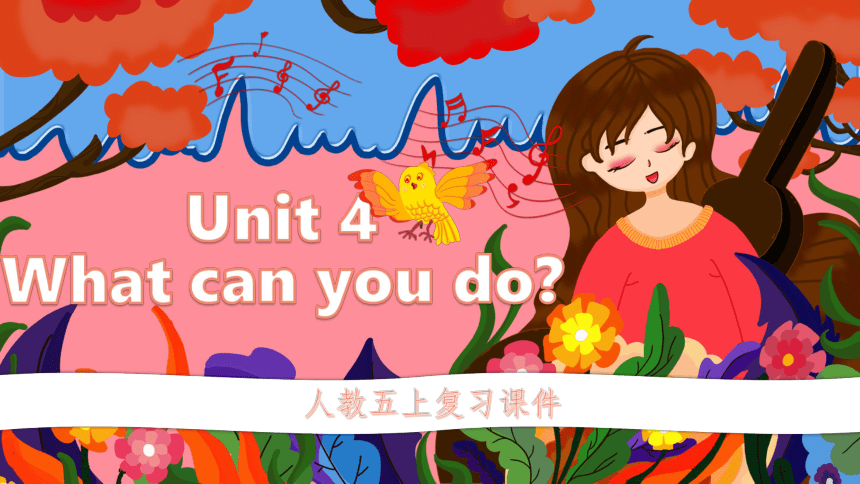
|
|
| 格式 | pptx | ||
| 文件大小 | 25.7MB | ||
| 资源类型 | 试卷 | ||
| 版本资源 | 人教版(PEP) | ||
| 科目 | 英语 | ||
| 更新时间 | 2024-08-16 09:21:18 | ||
图片预览

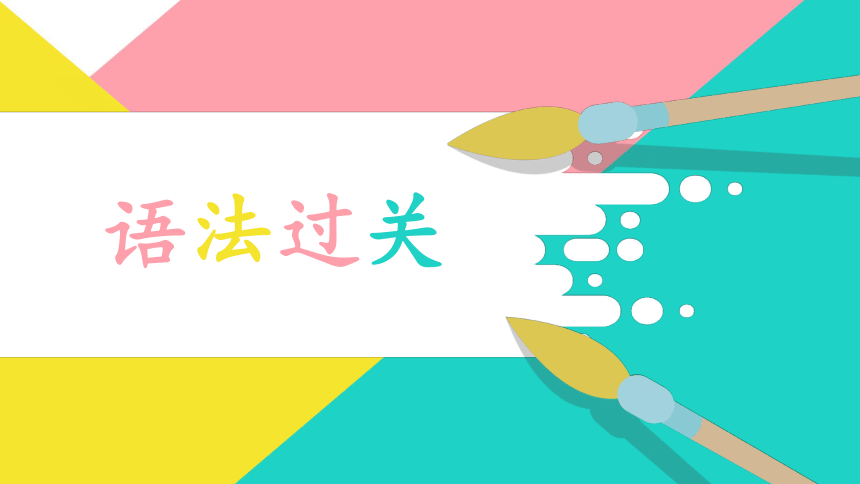
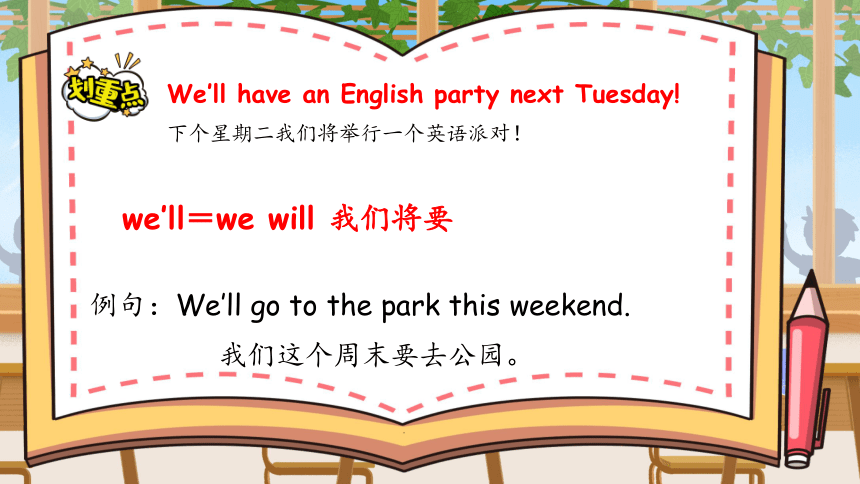
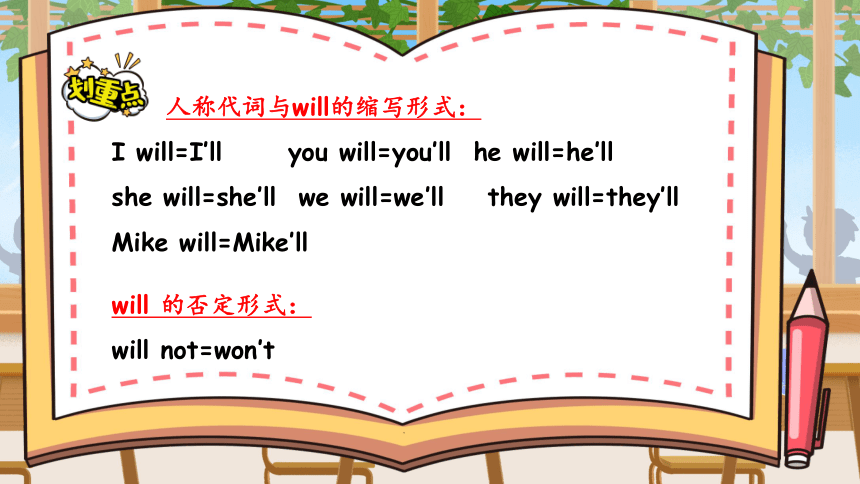
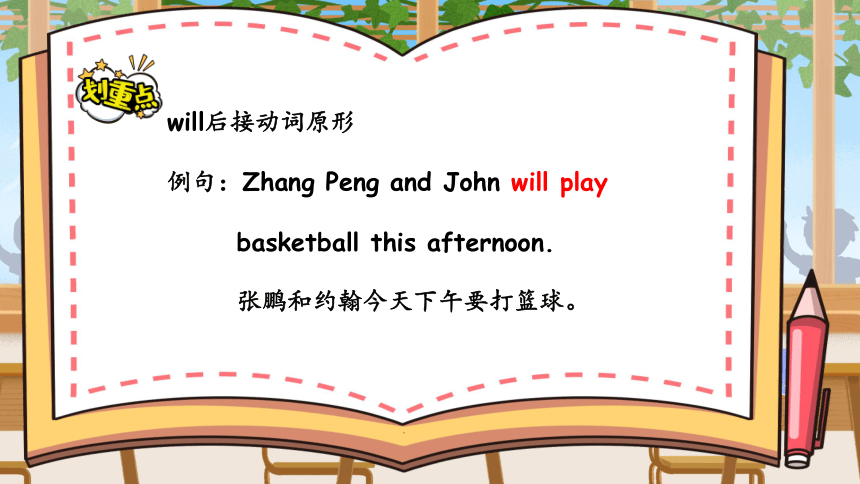
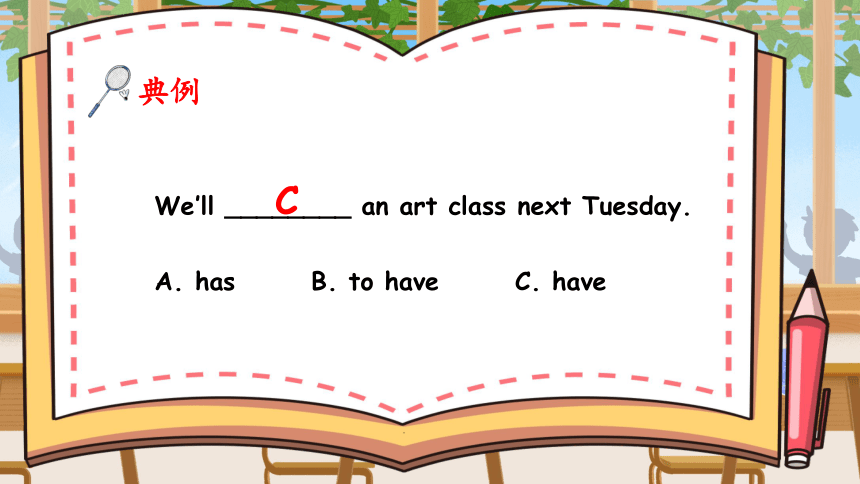
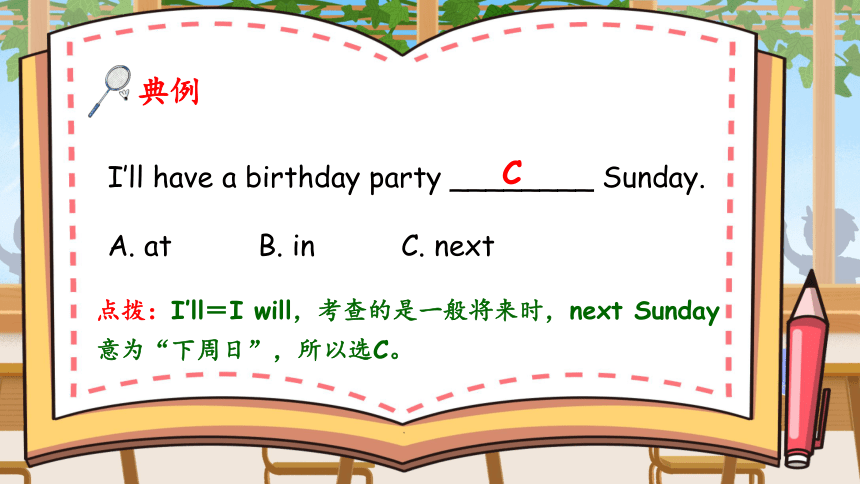
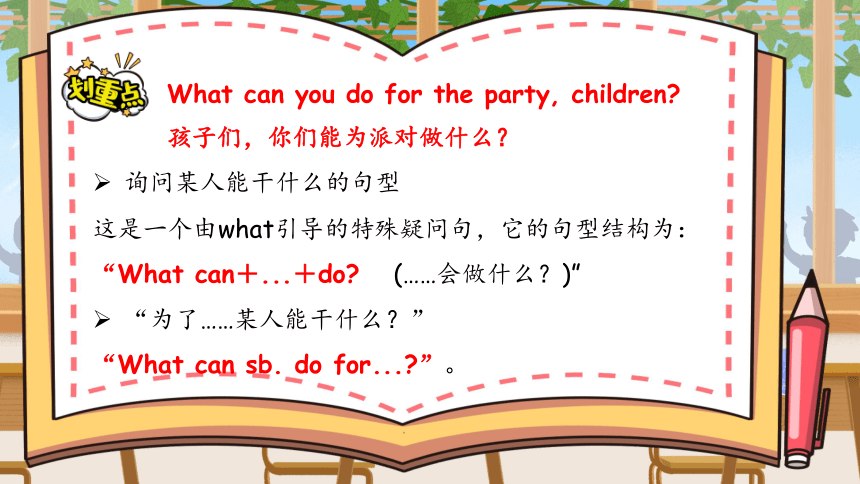
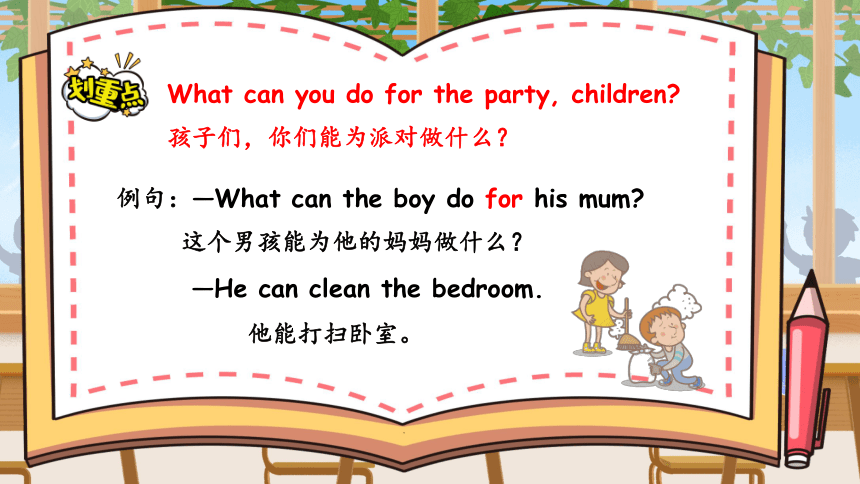
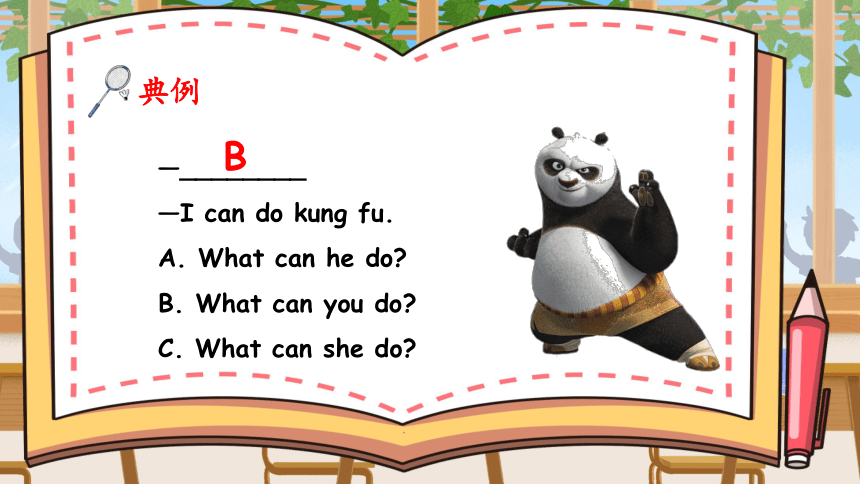
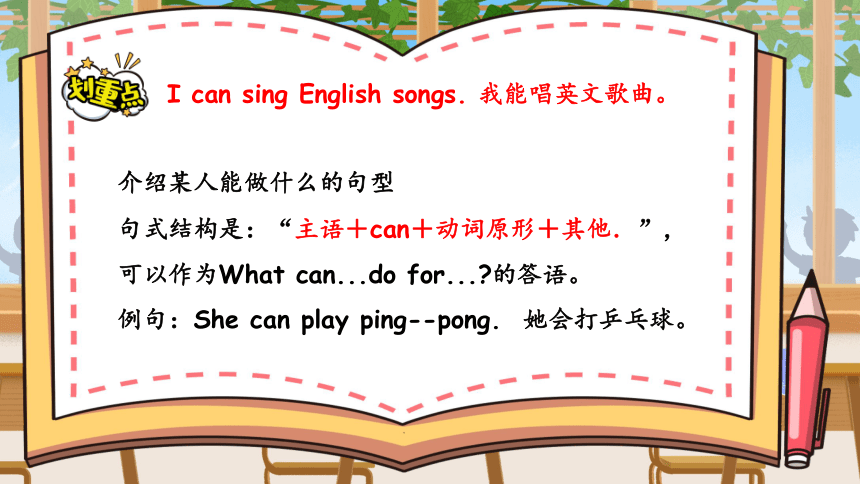
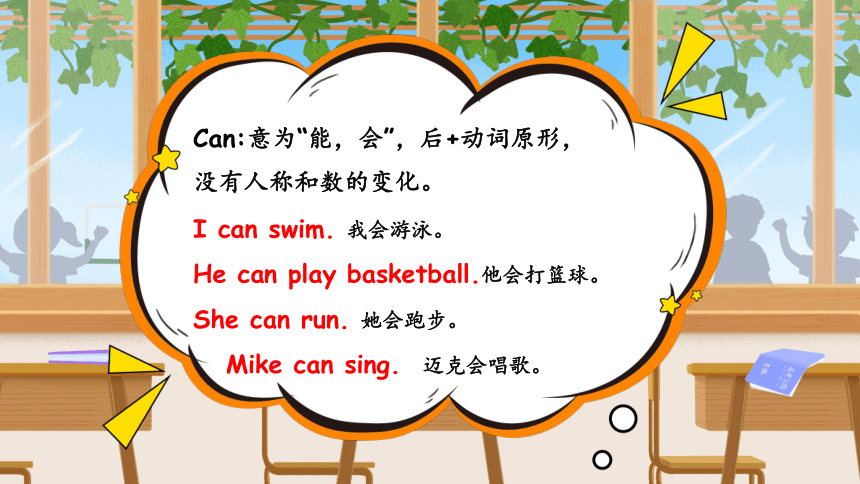
文档简介
(共58张PPT)
Unit 4
What can you do
人教五上复习课件
语法过关
We’ll have an English party next Tuesday!
下个星期二我们将举行一个英语派对!
we’ll=we will 我们将要
例句:We’ll go to the park this weekend.
我们这个周末要去公园。
will 的否定形式:
will not=won’t
人称代词与will的缩写形式:
I will=I’ll you will=you’ll he will=he’ll she will=she’ll we will=we’ll they will=they’ll
Mike will=Mike’ll
will后接动词原形
例句:Zhang Peng and John will play basketball this afternoon.
张鹏和约翰今天下午要打篮球。
We’ll ________ an art class next Tuesday.
A. has B. to have C. have
C
典例
I’ll have a birthday party ________ Sunday.
A. at B. in C. next
C
典例
点拨:I’ll=I will,考查的是一般将来时,next Sunday意为“下周日”,所以选C。
What can you do for the party, children
孩子们,你们能为派对做什么?
询问某人能干什么的句型
这是一个由what引导的特殊疑问句,它的句型结构为:“What can+...+do (……会做什么?)”
“为了……某人能干什么?”
“What can sb. do for... ”。
What can you do for the party, children
孩子们,你们能为派对做什么?
例句:—What can the boy do for his mum
这个男孩能为他的妈妈做什么?
—He can clean the bedroom.
他能打扫卧室。
—________
—I can do kung fu.
A. What can he do
B. What can you do
C. What can she do
B
典例
I can sing English songs. 我能唱英文歌曲。
介绍某人能做什么的句型
句式结构是:“主语+can+动词原形+其他.”,可以作为What can...do for... 的答语。
例句:She can play ping -pong. 她会打乒乓球。
Can:意为“能,会”,后+动词原形,
没有人称和数的变化。
I can swim. 我会游泳。
He can play basketball.他会打篮球。
She can run. 她会跑步。
Mike can sing. 迈克会唱歌。
Chen Jie can________ English songs.
A. sing B. sings C. singing
典例
A
点拨:
can后接动词原形,因此选A。
How about you, John 你呢,约翰?
“How about... ”意义及答语
意为“……怎么样 ”,常用于抛出话题后,询问别人的情况怎样。How about... 后接名词、人称代词的宾格等形式。
How about you, John 你呢,约翰?
例句:—I’m from UK. How about you
我来自英国。你呢?
—I’m from the USA.
我来自美国。
—I can draw cartoons. How about you
—Sorry, I can’t. __________
A. What can you do
B. Can you draw cartoons
C. Can they draw cartoons
典例:选出画线句子所表达的意思。
B
根据答句Sorry, I can’t.可
知问句是一般疑问句, 因此排除A。然后根据答句的主语I排除C。故选B。
How about you, John 你呢,约翰?
How about... =What about... 表达“……怎么样?”
例句:Zhang Peng can draw pictures.
What about Mike
张鹏能画画。迈克怎么样?
Who can dance 谁能跳舞?
用法:这是一个由who引导的特殊疑问句,用来询问谁能干什么。
简单答语是:某人.
完整答语是:某人+can+动词原形.
Who can dance 谁能跳舞?
例句:—Who can play the erhu
谁能拉二胡?
—Zhang Lan can play the erhu.
张兰能拉二胡。
—________
—Me.
A. Can you draw cartoons
B. Who can draw cartoons
C. What can you do
典例
B
—Can you do any kung fu, John 约翰,你能练武术吗?
—Yes, I can. 是的,我能。
can引导的一般疑问句的用法及答语
用来询问对方是否会做某事。
句型结构为:Can+主语+动词原形+其他?
肯定回答是“Yes, 人称代词(主格)+can.(是的,...能。)”否定回答是“No, 人称代词(主格)+can’t.(不,…不能。)”
can的用法:
情态动词can,can,“能”、“会”意思记在心。
不管主语怎么换,can的模样不会变。
句中只要出现can,动词原形后面跟。
一般疑问can提前,否定can后not添。
连词成句
the, you, classroom, can, clean( )
______________________________
典例
Can you clean the classroom
any/'eni/adj.任何的;任一的[三会]
例句:—Do you have any storybooks
你们有故事书吗?
—Yes, we do.是的,我们有。
形近词:and (并且) many (许多)
其他含义:一些
any/'eni/adj.任何的;任一的[三会]
例句:
Sorry, we don’t have any tea. We have juice and milk.
对不起,我们一点儿茶也没有。我们有果汁和牛奶。
any的用法
(1)any后面既可以接可数名词,也可以接不可数名词。
I don’t have any science books. 我没有科学书。
(2)any 常用在否定句和疑问句中。
Do you have any friends in Shanghai
你在上海有朋友吗?
—Can you sing ________ songs
—Yes, I can.
A.a B.any C.much
典例
B
点拨:
any一般用在疑问句和否定句中。
any 与some的区别:
相同点:都表示一些,很多
区别:any:用语否定句,疑问句。
some:用语肯定句,
(或语气委婉的疑问句)
cook/k k/ v.烹调;烹饪
例句:Mike can cook.迈克能烹饪。
发音:字母组合oo发/ /。
短语:cook the meal 做饭 cook dinner做晚餐
cook/k k/ v.烹调;烹饪
(1)cook是个动词,在词尾+er,变成了名词cooker,意思是“厨灶,炉具”。
(2)cook也可以作名词,意为“厨师”。
魔法记忆:
一个厨师(cook)在厨房做饭(cook)。
I can’t do any kung fu.我不会练武术。
含有情态动词can的否定句
其中can’t是can not的缩写,表示“不能,不会”。
句型结构为:主语+can’t(can与not的缩写)+动词原形+其他.。
例句:I can’t cook.我不能烹饪。
Mike can do his homework.(变否定句)
______________________________
典例
Mike can’t do his homework.
I can speak English, but I ________ sing English songs.
A. do B. can C. can’t
典例
C
连词成句。
can’t, Jack, Chinese, speak (.)
______________________________
典例
Jack can’t speak Chinese.
problem /'pr bl m/ n.问题[三会]
例句:I have a problem.我有一个问题。
发音:字母o发/ /,字母e发/ /。
复数:problems
No problem. 没问题。
(1)用来表示同意或愉快地回答请求,意为:没问题。 A:Could you open the door for me 你能为我把门打开吗?
B:No problem.没问题。
(2)用来表示有能力做某事,意为:没问题。 A:Can you make a kite
你会做风筝吗?
B:No problem.没问题。
No problem. 没问题。
(3)用于回答感谢,意为:不客气;没什么。 A:Thank you very much.
非常感谢你。
B:No problem.不客气。
Do you want a new friend
你想要一位新朋友吗?
want
+名词 表示想要......
+to+动词原形 想要做某事
Do you want a new friend
你想要一位新朋友吗?
例句:I want a new bike.我想要一辆新的自行车。
I want to go home. 我想回家。
1.you,do,want,an apple ( )
______________________________
2.want,I,play,to,piano,the (.)
______________________________
典例:连词成句。
Do you want an apple
I want to play the piano.
Please send me an email at robin@.
at的用法
+邮件地址
在,表位置
+点钟,时刻
Please send me an email at robin@.
Ilike to stay at home.我喜欢待在家里。
I always get up at 7 o’clock.
我总是在7点起床。
①You can send me an email ______ tom@.
A.for B.to C.at
②He goes to school________ 7:30 am.
A.on B. at C. in
③ Is he ______ home now
A.at B.to C.of
典例:
C
B
A
play与文体活动名称搭配的用法
后接“球类”名词时的意义及用法
意为“踢、打”,此时表示“球类”的名词前不用冠词。
例句:Let’s go and play football.
让我们去踢足球吧。
play
play ping-pong
play hocky
play baseball
play
football
play badminton
play basketball
play tennis
play与文体活动名称搭配的用法
后接“乐器”名词时的意义及用法
意为“演奏”,这时名词前须加定冠词the。
例句:The boy can play the piano.
这个男孩会弹钢琴。
play
play the violin
play the guitar
play the piano
play the
flute
play the erhu
play the pipa
play the drum
I often play ________ guzheng. I sometimes play ________ football.
A. /, the B. the, the C. the, /
典例:
C
Summary
(1)play+球类
eg:play basketball play football
(2)play+the+乐器
eg:play the guiter play the erhu
(3)play+with+人/物品
eg:play with my friend.
Here comes some tasty food.
Here位于句首引导的倒装句。
句型结构:Here come/comes +名词
例句:Here comes the car. 小汽车来了。
Here ________ the bus.
A. come B. coming C. comes
典例:
C
1.the,here,comes,subway(.)
________________________________________
2.teacher,comes,here,a(.)
________________________________________
典例:
Here comes the subway.
Here comes a teacher.
Don’t throw me into the lake,please!
请不要把握扔进湖里!
祈使句的用法:
祈使句用于表达命令,请求,劝告,禁止等。
祈使句的句型--肯定式
①Be型:Be+表语(+其他)! Be quite!
②Do型:实义动词原形(+其他)! Stand up!
③Let型:Let+宾语+动词原形(+其他)! Let’s go to school!
祈使句的句型--否定式
①Be型: Don'tbe+表语(+其他)!
② Do型: Don't+实义动词原形(+其他)!
③Let型: Let+宾语+not+动词原形(+其他)!
Don't let+宾语+动词原形(+其他)!
④No 型: No+名词/动词的-ing形式(+其他).
例句:
Be careful! Here comes the truck. 小心!卡车来了。
Open your books! 把你们的书打开!
Let's go to the park. 我们去公园吧。
Don't be careless. 不要粗心。
Don't go out! 别出去!
例句:
Let's not waste time. 咱们不要浪费时间了。
Don't let me go with her tomorrow.
= Let me not go with her tomorrow.
不要让我明天跟她一起去。
No photos.禁止拍照。 No smoking.禁止吸烟。
Thank you for watching!
Unit 4
What can you do
人教五上复习课件
语法过关
We’ll have an English party next Tuesday!
下个星期二我们将举行一个英语派对!
we’ll=we will 我们将要
例句:We’ll go to the park this weekend.
我们这个周末要去公园。
will 的否定形式:
will not=won’t
人称代词与will的缩写形式:
I will=I’ll you will=you’ll he will=he’ll she will=she’ll we will=we’ll they will=they’ll
Mike will=Mike’ll
will后接动词原形
例句:Zhang Peng and John will play basketball this afternoon.
张鹏和约翰今天下午要打篮球。
We’ll ________ an art class next Tuesday.
A. has B. to have C. have
C
典例
I’ll have a birthday party ________ Sunday.
A. at B. in C. next
C
典例
点拨:I’ll=I will,考查的是一般将来时,next Sunday意为“下周日”,所以选C。
What can you do for the party, children
孩子们,你们能为派对做什么?
询问某人能干什么的句型
这是一个由what引导的特殊疑问句,它的句型结构为:“What can+...+do (……会做什么?)”
“为了……某人能干什么?”
“What can sb. do for... ”。
What can you do for the party, children
孩子们,你们能为派对做什么?
例句:—What can the boy do for his mum
这个男孩能为他的妈妈做什么?
—He can clean the bedroom.
他能打扫卧室。
—________
—I can do kung fu.
A. What can he do
B. What can you do
C. What can she do
B
典例
I can sing English songs. 我能唱英文歌曲。
介绍某人能做什么的句型
句式结构是:“主语+can+动词原形+其他.”,可以作为What can...do for... 的答语。
例句:She can play ping -pong. 她会打乒乓球。
Can:意为“能,会”,后+动词原形,
没有人称和数的变化。
I can swim. 我会游泳。
He can play basketball.他会打篮球。
She can run. 她会跑步。
Mike can sing. 迈克会唱歌。
Chen Jie can________ English songs.
A. sing B. sings C. singing
典例
A
点拨:
can后接动词原形,因此选A。
How about you, John 你呢,约翰?
“How about... ”意义及答语
意为“……怎么样 ”,常用于抛出话题后,询问别人的情况怎样。How about... 后接名词、人称代词的宾格等形式。
How about you, John 你呢,约翰?
例句:—I’m from UK. How about you
我来自英国。你呢?
—I’m from the USA.
我来自美国。
—I can draw cartoons. How about you
—Sorry, I can’t. __________
A. What can you do
B. Can you draw cartoons
C. Can they draw cartoons
典例:选出画线句子所表达的意思。
B
根据答句Sorry, I can’t.可
知问句是一般疑问句, 因此排除A。然后根据答句的主语I排除C。故选B。
How about you, John 你呢,约翰?
How about... =What about... 表达“……怎么样?”
例句:Zhang Peng can draw pictures.
What about Mike
张鹏能画画。迈克怎么样?
Who can dance 谁能跳舞?
用法:这是一个由who引导的特殊疑问句,用来询问谁能干什么。
简单答语是:某人.
完整答语是:某人+can+动词原形.
Who can dance 谁能跳舞?
例句:—Who can play the erhu
谁能拉二胡?
—Zhang Lan can play the erhu.
张兰能拉二胡。
—________
—Me.
A. Can you draw cartoons
B. Who can draw cartoons
C. What can you do
典例
B
—Can you do any kung fu, John 约翰,你能练武术吗?
—Yes, I can. 是的,我能。
can引导的一般疑问句的用法及答语
用来询问对方是否会做某事。
句型结构为:Can+主语+动词原形+其他?
肯定回答是“Yes, 人称代词(主格)+can.(是的,...能。)”否定回答是“No, 人称代词(主格)+can’t.(不,…不能。)”
can的用法:
情态动词can,can,“能”、“会”意思记在心。
不管主语怎么换,can的模样不会变。
句中只要出现can,动词原形后面跟。
一般疑问can提前,否定can后not添。
连词成句
the, you, classroom, can, clean( )
______________________________
典例
Can you clean the classroom
any/'eni/adj.任何的;任一的[三会]
例句:—Do you have any storybooks
你们有故事书吗?
—Yes, we do.是的,我们有。
形近词:and (并且) many (许多)
其他含义:一些
any/'eni/adj.任何的;任一的[三会]
例句:
Sorry, we don’t have any tea. We have juice and milk.
对不起,我们一点儿茶也没有。我们有果汁和牛奶。
any的用法
(1)any后面既可以接可数名词,也可以接不可数名词。
I don’t have any science books. 我没有科学书。
(2)any 常用在否定句和疑问句中。
Do you have any friends in Shanghai
你在上海有朋友吗?
—Can you sing ________ songs
—Yes, I can.
A.a B.any C.much
典例
B
点拨:
any一般用在疑问句和否定句中。
any 与some的区别:
相同点:都表示一些,很多
区别:any:用语否定句,疑问句。
some:用语肯定句,
(或语气委婉的疑问句)
cook/k k/ v.烹调;烹饪
例句:Mike can cook.迈克能烹饪。
发音:字母组合oo发/ /。
短语:cook the meal 做饭 cook dinner做晚餐
cook/k k/ v.烹调;烹饪
(1)cook是个动词,在词尾+er,变成了名词cooker,意思是“厨灶,炉具”。
(2)cook也可以作名词,意为“厨师”。
魔法记忆:
一个厨师(cook)在厨房做饭(cook)。
I can’t do any kung fu.我不会练武术。
含有情态动词can的否定句
其中can’t是can not的缩写,表示“不能,不会”。
句型结构为:主语+can’t(can与not的缩写)+动词原形+其他.。
例句:I can’t cook.我不能烹饪。
Mike can do his homework.(变否定句)
______________________________
典例
Mike can’t do his homework.
I can speak English, but I ________ sing English songs.
A. do B. can C. can’t
典例
C
连词成句。
can’t, Jack, Chinese, speak (.)
______________________________
典例
Jack can’t speak Chinese.
problem /'pr bl m/ n.问题[三会]
例句:I have a problem.我有一个问题。
发音:字母o发/ /,字母e发/ /。
复数:problems
No problem. 没问题。
(1)用来表示同意或愉快地回答请求,意为:没问题。 A:Could you open the door for me 你能为我把门打开吗?
B:No problem.没问题。
(2)用来表示有能力做某事,意为:没问题。 A:Can you make a kite
你会做风筝吗?
B:No problem.没问题。
No problem. 没问题。
(3)用于回答感谢,意为:不客气;没什么。 A:Thank you very much.
非常感谢你。
B:No problem.不客气。
Do you want a new friend
你想要一位新朋友吗?
want
+名词 表示想要......
+to+动词原形 想要做某事
Do you want a new friend
你想要一位新朋友吗?
例句:I want a new bike.我想要一辆新的自行车。
I want to go home. 我想回家。
1.you,do,want,an apple ( )
______________________________
2.want,I,play,to,piano,the (.)
______________________________
典例:连词成句。
Do you want an apple
I want to play the piano.
Please send me an email at robin@.
at的用法
+邮件地址
在,表位置
+点钟,时刻
Please send me an email at robin@.
Ilike to stay at home.我喜欢待在家里。
I always get up at 7 o’clock.
我总是在7点起床。
①You can send me an email ______ tom@.
A.for B.to C.at
②He goes to school________ 7:30 am.
A.on B. at C. in
③ Is he ______ home now
A.at B.to C.of
典例:
C
B
A
play与文体活动名称搭配的用法
后接“球类”名词时的意义及用法
意为“踢、打”,此时表示“球类”的名词前不用冠词。
例句:Let’s go and play football.
让我们去踢足球吧。
play
play ping-pong
play hocky
play baseball
play
football
play badminton
play basketball
play tennis
play与文体活动名称搭配的用法
后接“乐器”名词时的意义及用法
意为“演奏”,这时名词前须加定冠词the。
例句:The boy can play the piano.
这个男孩会弹钢琴。
play
play the violin
play the guitar
play the piano
play the
flute
play the erhu
play the pipa
play the drum
I often play ________ guzheng. I sometimes play ________ football.
A. /, the B. the, the C. the, /
典例:
C
Summary
(1)play+球类
eg:play basketball play football
(2)play+the+乐器
eg:play the guiter play the erhu
(3)play+with+人/物品
eg:play with my friend.
Here comes some tasty food.
Here位于句首引导的倒装句。
句型结构:Here come/comes +名词
例句:Here comes the car. 小汽车来了。
Here ________ the bus.
A. come B. coming C. comes
典例:
C
1.the,here,comes,subway(.)
________________________________________
2.teacher,comes,here,a(.)
________________________________________
典例:
Here comes the subway.
Here comes a teacher.
Don’t throw me into the lake,please!
请不要把握扔进湖里!
祈使句的用法:
祈使句用于表达命令,请求,劝告,禁止等。
祈使句的句型--肯定式
①Be型:Be+表语(+其他)! Be quite!
②Do型:实义动词原形(+其他)! Stand up!
③Let型:Let+宾语+动词原形(+其他)! Let’s go to school!
祈使句的句型--否定式
①Be型: Don'tbe+表语(+其他)!
② Do型: Don't+实义动词原形(+其他)!
③Let型: Let+宾语+not+动词原形(+其他)!
Don't let+宾语+动词原形(+其他)!
④No 型: No+名词/动词的-ing形式(+其他).
例句:
Be careful! Here comes the truck. 小心!卡车来了。
Open your books! 把你们的书打开!
Let's go to the park. 我们去公园吧。
Don't be careless. 不要粗心。
Don't go out! 别出去!
例句:
Let's not waste time. 咱们不要浪费时间了。
Don't let me go with her tomorrow.
= Let me not go with her tomorrow.
不要让我明天跟她一起去。
No photos.禁止拍照。 No smoking.禁止吸烟。
Thank you for watching!
